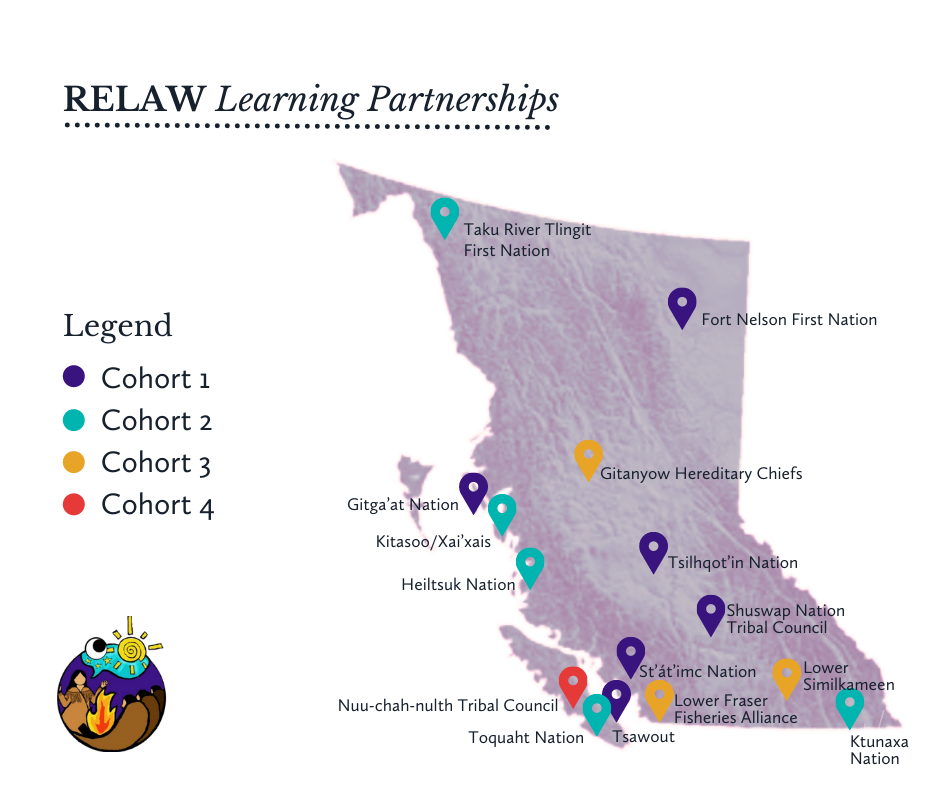
West Coast has been working with Indigenous nations throughout British Columbia for over 20 years. Through this experience, our legal team has had the opportunity to learn from Indigenous peoples about their ways of knowing – ways that are grounded in Indigenous laws expressed in Indigenous stories, songs, art, language, ceremonies, and nature itself.
We understand the process of articulating, revitalizing, and applying Indigenous law to be collaborative and deliberative, and we are committed to deepening community-based capacity to engage in this process. To that end, RELAW provides co-learning opportunities and legal support to Indigenous nations using their own laws to address environmental and other issues affecting their territories. RELAW is supportive of and supported by the Indigenous Law Research Unit (ILRU) at the University of Victoria.
Our approach in RELAW is one of collaboration where we work with the Indigenous nations in a partnership that values relationships and reciprocity. Together we research Indigenous laws, summarize and draft legal principles and help communities decide how these principles should be applied on the ground, including through the development of written laws or plans if that is their choice.
The RELAW Program has two components:
- RELAW Projects (partnerships with Nations that last years), and;
- RELAW Co-learning Program (yearly cohorts of like-minded individuals).
1. RELAW Projects
Through RELAW Projects, Indigenous nations have developed contemporary expressions of their laws to address ocean protection, watershed management, fisheries governance, impact assessment and more. By living and enforcing their own laws, Indigenous nations are having transformative impacts on environmental decision-making in their territories.

To learn more, see this Backgrounder on RELAW Learning Partnerships. You can also read these short publications from participating nations telling the story of their RELAW projects:
- Revitalizing Indigenous Law with the Lower Fraser Fisheries Alliance: The LFFA-RELAW Team’s experience so far
- Revitalizing St’át’imc Law for Land, Air and Water: Telling the RELAW Story
- Shuswap Nation Tribal Council: Telling the RELAW Story
- Revitalizing Haíɫzaqv Law for Land, Air and Water: Telling the RELAW Story
- LFFA-RELAW Summary Report and Volumes
- Video: Taku River Tlingit First Nation’s Journey to Revitalize its Indigenous Laws
- nʔaysnúlaʔxw iʔ k̓̓łluxwnwixwmntət: The Declaration of the Ashnola Protected and Conserved Area
2. RELAW Co-learning Program
The RELAW Co-learning Program is open to both RELAW Project Partners and individual co-learners from nations that are not currently participating in a RELAW project but wish to deepen their capacity to implement their own people’s vision for Indigenous law revitalization.
To learn more about RELAW's Co-learning Program, see:
- This short film, “Living Indigenous Laws"
- A blog about the RELAW Program, “Understanding the stories of the land: My first year with the RELAW Project”
- A blog about our June 2022 Retreat 3: Indigenous Law in Action, “Sharing Is The Law Here: Co-Learning On ƛaʔuukʷiʔatḥ (Tla-o-qui-aht) Territory”
- A blog about our November 2022 Retreat 1: Indigenous Law in Story, “The Ancestral Power of Co-learning and Collective Knowledge”
RELAW contributes to the resurgence of Indigenous laws and our commitment to transforming the legal landscape in ways that are more sustainable, democratic and just.